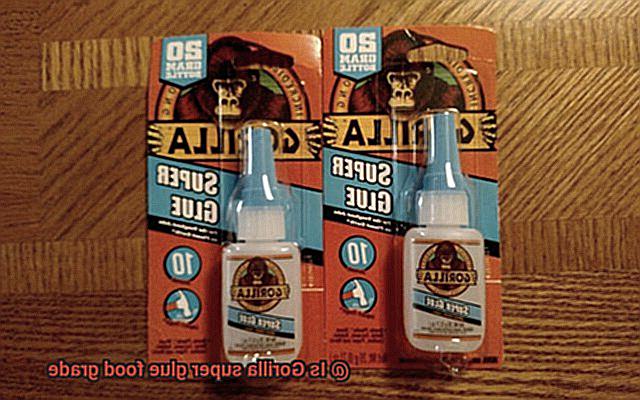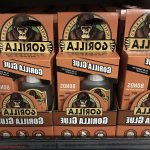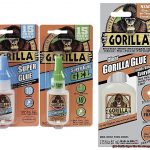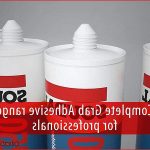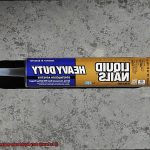Imagine this: you’re fixing a broken plate or a kitchen gadget, and suddenly you’re hit with the nagging question, “Is Gorilla Super Glue really safe for food?” It’s a puzzling dilemma that can leave any DIY enthusiast scratching their head. We all know that when it comes to gluing objects meant for eating or drinking, we need to be extra careful. But does this popular adhesive pass the culinary safety test?
In this blog post, we’ll dive into the captivating world of Gorilla Super Glue – a tough adhesive known for its strength and versatility. We’ll explore what it takes for an adhesive to earn that coveted food-grade certification, and navigate the blurry line between skepticism and solid evidence. So get ready to join us on a journey as we uncover the truth about whether Gorilla Super Glue is truly food grade. Along the way, we’ll debunk myths and arm you with the knowledge you need for any sticky situation.
What is Gorilla Super Glue?
Contents
- 1 What is Gorilla Super Glue?
- 2 What Does Food Grade Mean?
- 3 Is Gorilla Super Glue Food Grade?
- 4 Potential Risks of Using Non-Food Grade Adhesives
- 5 Alternatives to Gorilla Super Glue for Food-Related Applications
- 6 How to Choose the Right Adhesive for Food-Related Applications
- 6.1 Safety First: Look for Food-Grade Certification
- 6.2 Chemical Composition: Say No to Nasty Additives
- 6.3 Resistance to Moisture and Temperature: Keep It Strong and Stable
- 6.4 Compatibility with Materials: Stick Together Seamlessly
- 6.5 Ease of Use and Application: Hassle-Free Crafting
- 6.6 Seek Expert Advice: Tap Into the Wisdom of Professionals
- 7 Conclusion
When it comes to tackling your DIY projects, having a reliable adhesive is essential. That’s where Gorilla Super Glue comes in. This powerhouse adhesive is renowned for its versatility, durability, and unbeatable bonding strength, making it the go-to choice for professionals and hobbyists alike.
Versatile Bonding Power:
Gorilla Super Glue is a true champion when it comes to bonding. Its exceptional formula allows it to bond quickly and securely to a wide variety of surfaces, both porous and non-porous. From wood to metal, ceramic to plastic, rubber to fabric, there’s no material that Gorilla Super Glue can’t handle. It effortlessly tackles any DIY project with ease and precision.
Strength and Durability:
Prepare to be amazed by the sheer strength of Gorilla Super Glue. Once dry, it forms an unyielding bond that can endure the test of time. Stubborn impact? No problem. Harsh moisture? Not a chance. Temperature fluctuations? It laughs in the face of adversity. Whether your glued items face the elements indoors or outdoors, rest assured they will stay firmly intact.
Ease of Use:
Don’t be fooled by its mighty strength – Gorilla Super Glue is also incredibly user-friendly. Thanks to its precision applicator housed in a compact tube, applying the glue is a breeze. No more messy mishaps or wasted product. Just a few precise drops are all it takes for professional-quality results. Say goodbye to frustration and hello to efficiency.
Precautions:
While Gorilla Super Glue is undeniably powerful, handling it with care is crucial. The fumes emitted during use can be potent, so make sure to work in a well-ventilated area. Avoid any contact with your skin or eyes as it may cause irritation or burns. Additionally, keep in mind that Gorilla Super Glue is not classified as food grade, so it should not be used on items that come into direct contact with food or beverages.
What Does Food Grade Mean?
Let’s dive into the world of food safety and explore this term in more detail.
- Definition: When a product is deemed food grade, it signifies that it has undergone rigorous testing and meets specific standards set by regulatory authorities to ensure food safety. Whether it’s a packaging material, a processing tool, or even an adhesive like Gorilla Super Glue, being food grade means it’s safe for direct or indirect contact with food.
- Criteria: To be considered food grade, a product must meet certain criteria. These criteria may vary from country to country, but the general idea remains the same. Food grade products must be:
- Non-toxic: They should not contain any harmful substances that could contaminate our beloved food.
- Non-reactive: They should not react with the food, altering its taste, appearance, or quality.
- Free from harmful substances: They should be free from chemicals or components that could potentially leach into the food and cause harm.
- Materials: The materials used in food grade products are carefully selected to prevent any leaching of harmful chemicals into the food. For example, in the case of adhesives, those that are specifically formulated for use with food are made from ingredients that are approved for such contact. These ingredients can include certain types of resins or polymers that have been deemed safe for use in food-related applications.
- Not all adhesives are created equal: It’s important to note that not all adhesives or glues are suitable for direct or prolonged contact with food. While some may be safe for incidental contact, they may not meet the rigorous standards required for extended exposure. In the case of Gorilla Super Glue, it is not explicitly labeled as food grade. Therefore, it’s best to avoid using it directly on surfaces that will come into contact with your scrumptious meals.
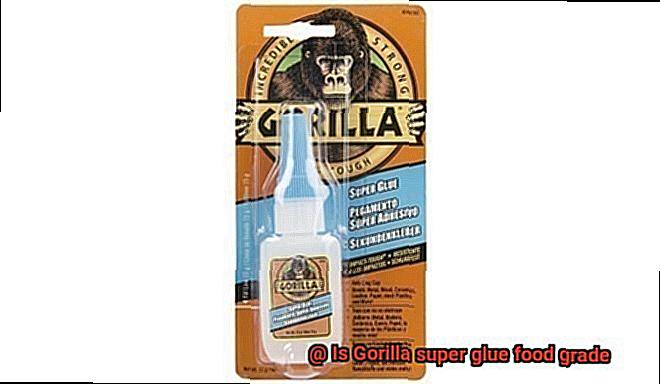
Is Gorilla Super Glue Food Grade?
Here’s the deal: Gorilla Super Glue, while strong and versatile, is not suitable for anything food-related. Let me break it down for you.
To be food grade, an adhesive has to go through rigorous testing to meet health and safety standards for use in food processing or packaging. Unfortunately, Gorilla Super Glue doesn’t make the cut.
One of the main ingredients in Gorilla Super Glue is cyanoacrylate. This fast-acting adhesive forms a strong bond when exposed to moisture. Sounds great, right? Well, here’s the catch – it can release small amounts of chemicals when in contact with moisture or heat. And those chemicals could potentially migrate into your food, which isn’t exactly appetizing.
Now, let’s look at the evidence. The safety data sheet provided by Gorilla Glue for their Super Glue products doesn’t mention anything about being food grade or suitable for use with food. That’s a pretty clear sign that it’s not intended for direct contact with food or consumption.
So, what should you do if you need to repair something that will come into contact with food? Easy – choose adhesives that are explicitly labeled as food safe. These adhesives are designed to be non-toxic and resistant to moisture and heat, ensuring they won’t pose any potential health risks.
Potential Risks of Using Non-Food Grade Adhesives
Imagine savoring a mouthwatering meal, only to discover that the adhesive holding your plate together is slowly contaminating your food. In this blog post, we will explore the potential risks associated with using non-food grade adhesives in food-related applications. So, grab a snack (but make sure it’s safe.) and join us as we delve into this sticky situation.
Chemical Migration:
Non-food grade adhesives often contain harmful chemicals that can seep into your food upon contact. Solvents, plasticizers, and additives found in these adhesives are not meant for consumption and can pose serious health risks when ingested. It’s like inviting unwanted guests to your dinner party.
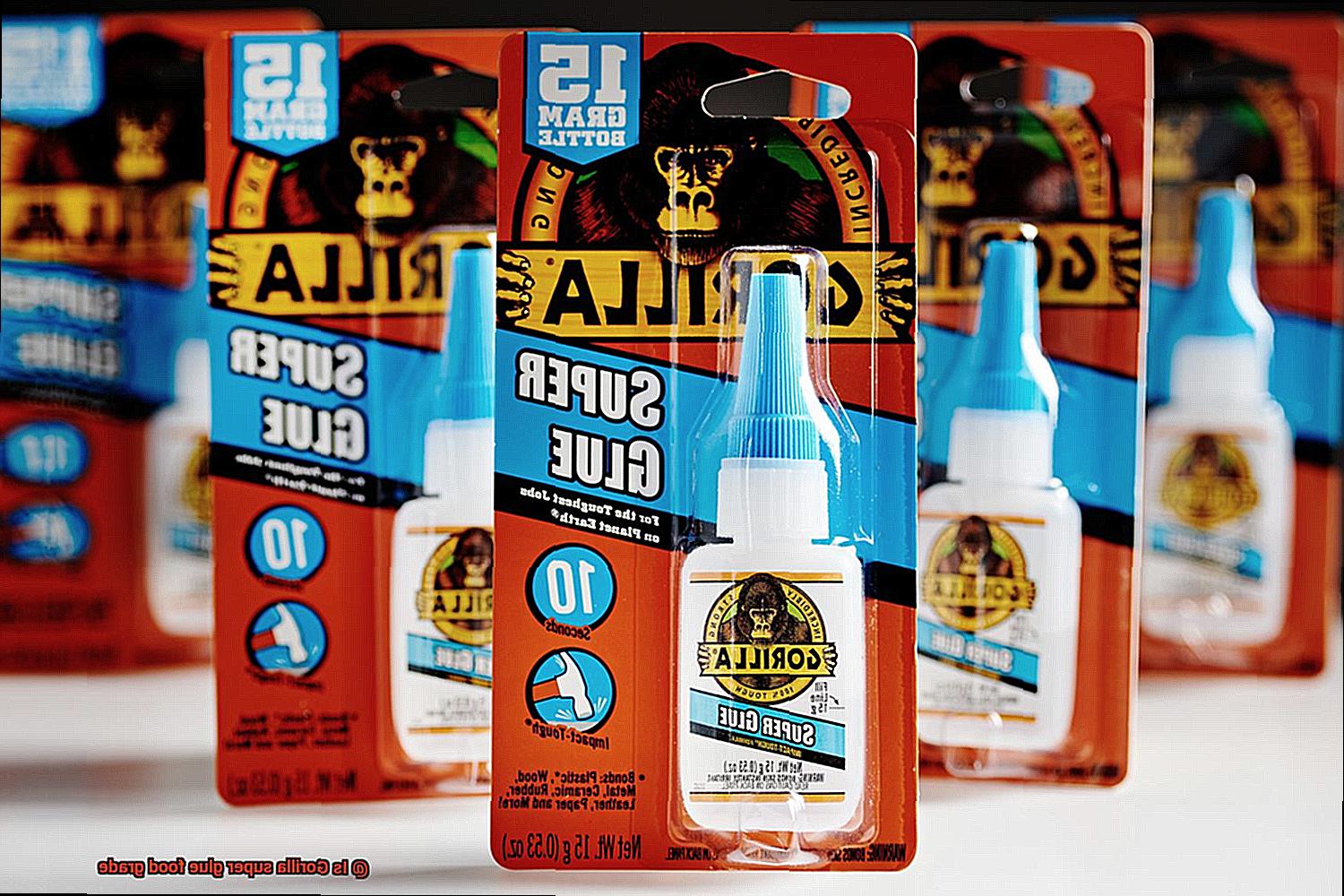
Adhesive Failure:
Packaging your delectable treats with an adhesive that cannot withstand the conditions of food processing or storage is a recipe for disaster. Non-food grade adhesives may lack resistance to high temperatures, moisture, or chemicals commonly used in the food industry. This increases the risk of adhesive failure, compromising packaging integrity and potentially contaminating your food.
Safety and Regulatory Standards:
Food-grade adhesives are specifically manufactured to meet stringent safety and regulatory standards set by authorities like the FDA or EFSA. These standards ensure that the adhesive is safe for direct contact with food, protecting human health. Employing non-food grade adhesives can lead to legal trouble for businesses, resulting in penalties, fines, or even legal action.
Consumer Trust and Reputation:
In today’s interconnected world of social media and online reviews, one negative experience can quickly tarnish a brand’s reputation. Consumers prioritize food safety, and using non-food grade adhesives erodes their trust in a product or brand. To maintain consumer loyalty, businesses must prioritize safety and compliance by using adhesives explicitly labeled as food safe.
Alternatives to Gorilla Super Glue for Food-Related Applications
When it comes to food-related applications, safety should be the top priority. Choosing adhesives specifically formulated and labeled as food grade is essential. While Gorilla Super Glue is popular for general applications, it is not recommended for use near or on food. In this article, we will explore safe and reliable alternatives to Gorilla Super Glue that are suitable for food-related projects.
Food-Grade Epoxy Adhesive:
One excellent alternative to Gorilla Super Glue is a food-grade epoxy adhesive. These adhesives offer a strong bond and durability, making them ideal for various food-related repairs and projects. Food-grade epoxy adhesives are formulated using ingredients that comply with specific regulations and standards to ensure safety when in contact with food. They require proper mixing of the resin and hardener before application.
Food-Safe Silicone Adhesive:
Another option worth considering is a food-safe silicone adhesive. Silicone adhesives are flexible, waterproof, and resistant to high temperatures, making them perfect for sealing and bonding applications in the kitchen or other food-related environments. Food-safe silicone adhesives are specifically designed to be non-toxic and safe for use with food.
Food-Grade Adhesive Tapes:
For temporary repairs or non-permanent bonding needs in the kitchen, food-grade adhesive tapes can be a convenient alternative to Gorilla Super Glue. These tapes are safe for direct contact with food and provide a strong adhesive bond. They are often used for sealing containers, repairing packaging, or securing labels.
Mechanical Fasteners:
In some cases, mechanical fasteners such as stainless steel screws, nuts, and bolts can be a suitable alternative to using glue in food-related applications. These fasteners provide a secure and removable connection without the need for adhesives. They are commonly used in equipment assembly, food processing machinery, or fixing kitchen fixtures.
How to Choose the Right Adhesive for Food-Related Applications
Choosing the right adhesive for food-related applications is crucial. In this article, we will explore the key factors to consider when selecting an adhesive that is safe, reliable, and perfect for your culinary creations.
Safety First: Look for Food-Grade Certification
When it comes to adhesives that come into direct contact with food, safety is paramount. Look for adhesives that are specifically labeled as “food grade.” These adhesives have undergone rigorous testing to ensure they are non-toxic, odorless, and free from harmful chemicals that could contaminate your delicious dishes.
Chemical Composition: Say No to Nasty Additives
To protect your health and the integrity of your food, opt for adhesives that are free from harmful substances like BPA and phthalates. These additives can leach into your food and pose serious health risks. Read product labels carefully and choose adhesives that proudly proclaim their freedom from these toxins.
Resistance to Moisture and Temperature: Keep It Strong and Stable
Food-related applications often involve exposure to moisture, heat, or freezing conditions. Ensure the adhesive you choose is waterproof and can withstand the temperature range required for your specific culinary masterpiece. This will ensure a long-lasting bond that can withstand the demands of your kitchen adventures.
Compatibility with Materials: Stick Together Seamlessly
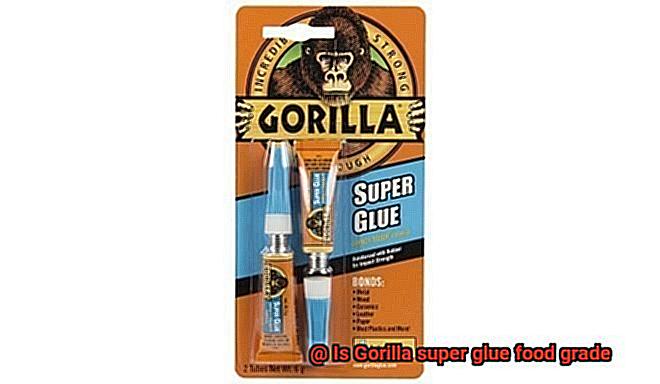
Your food-related projects may involve bonding different surfaces such as glass, metal, plastic, or wood. To avoid disappointment, select an adhesive that is compatible with the materials you are working with. This will guarantee a strong bond that stands the test of time.
Ease of Use and Application: Hassle-Free Crafting
We all love a hassle-free crafting experience. Look for adhesives that are easy to use, provide a reasonable working time, and offer a strong bond once cured. This will make your DIY projects a breeze and ensure that your creations are ready to be admired or used in no time.
Seek Expert Advice: Tap Into the Wisdom of Professionals
When in doubt, don’t hesitate to consult with experts or professionals in the field of food-grade adhesives. They can provide invaluable guidance and recommendations based on their experience and knowledge. Don’t be shy – reach out and make use of their expertise to ensure your adhesive choice is spot on.
bG60VfP5Z84″ >
Also Read: Is Glue Edible? – Glue Things
Conclusion
In conclusion, while Gorilla Super Glue is a formidable adhesive for all your DIY needs, it falls short in the food grade department. The presence of cyanoacrylate, its main ingredient, means that it can release trace amounts of chemicals when exposed to moisture or heat. These chemicals could potentially find their way into your food, which is definitely not what you want.
Unfortunately, the safety data sheet provided by Gorilla Glue doesn’t offer any reassurance about its food grade status. So if you’re working on projects that involve food, it’s crucial to prioritize safety and opt for adhesives explicitly labeled as food safe.
Food-grade adhesives have undergone rigorous testing to ensure they meet stringent criteria for non-toxicity, non-reactivity, and freedom from harmful substances. They’re specifically designed to withstand the demanding conditions of food processing and storage without compromising packaging integrity or risking contamination.
Luckily, there are alternatives to Gorilla Super Glue that are perfectly suitable for food-related projects. Consider options like food-grade epoxy adhesive, food-safe silicone adhesive, or even food-grade adhesive tapes. In certain applications, you can also rely on trusty mechanical fasteners like stainless steel screws, nuts, and bolts.
When selecting an adhesive for your culinary creations, remember to take into account factors such as safety certification, chemical composition, resistance to moisture and temperature changes, compatibility with materials, ease of use and application. And don’t hesitate to seek expert advice when needed – after all, it’s better to be safe than sorry.
Using non-food grade adhesives in food-related applications can lead to a whole host of potential risks. You could end up with chemical migration into your carefully prepared dishes or experience adhesive failure that compromises packaging integrity and risks contamination. Businesses that don’t comply with safety standards may even find themselves in legal trouble while also damaging consumer trust and their own reputation.
So do yourself a favor and choose the right adhesive for your culinary creations. Don’t let a simple oversight ruin all your hard work and passion for food.

